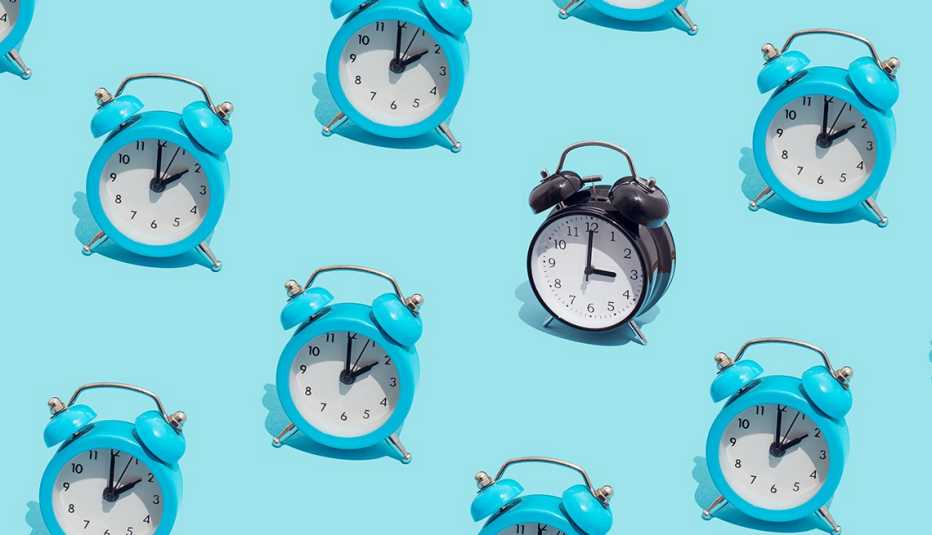AARP Hearing Center


When you set your clock forward an hour every spring for daylight saving time (DST)— as we'll do on March 9 — it doesn’t just make you feel tired, experts say. A growing amount of research indicates that it also affects your body in other surprising and negative ways.
For most people, setting the clock ahead in the spring is the most dreaded change. The average person gets about 40 minutes less sleep on the Monday after “springing forward” for daylight saving time, according to the Sleep Foundation.
Effects of daylight saving on the body
Daylight saving time throws your body’s internal clock out of whack, which can negatively affect your health in ways you don’t realize, says Jocelyn Cheng, M.D., a neurologist and sleep medicine specialist who is the vice-chair of the Public Safety Committee for the American Academy of Sleep Medicine.
“Light is the most powerful regulator of our circadian rhythm. When we change the light exposure we get in the morning and at night, it throws that off,” Cheng says. “There are adverse health consequences and real-life consequences as a result of that.”
Losing an hour may not seem like a big deal, but it “really can have a significant impact on our overall health and well-being,” says Melissa Lipford, M.D., a neurologist and sleep specialist at the Mayo Clinic.
Should we keep daylight saving?
Daylight saving time has been around in the United States since 1918 when it was thought to save energy during World War I. In recent years, increasing concerns about health effects have prompted at least 40 states to propose legislation to eliminate the twice-yearly time changes.
The average person gets about 40 minutes less sleep on the Monday after “springing forward” for daylight saving time, according to the Sleep Foundation. And experts say it’s not unusual for a person’s sleep to be disrupted for days or weeks afterward.
A 2020 survey conducted by the American Academy of Sleep Medicine found that 63 percent of adults would prefer to eliminate seasonal time changes.
In the fall, we talk about “gaining” an hour of sleep, but most people still experience a net loss of sleep time that night and in the days following because they wake up earlier, have more trouble falling asleep or wake up during the night, according to a review published in the journal Sleep Medicine Reviews.
Early risers tend to have the most trouble adjusting, the study said.
Even if you don’t feel tired, “Light is the most powerful regulator of our circadian rhythm. When we change the light exposure we get in the morning and at night, it throws that off,” Cheng says. “There are adverse health consequences and real-life consequences as a result of that.”
Here are six ways the disruptions from daylight saving time in the spring can affect your body.
1. Higher risk of heart attack and stroke
Daylight saving time takes a toll on your heart. One study found a 24 percent increase in heart attacks on the Monday after daylight saving time starts. Another found the risk of stroke is 8 percent higher on the two days following the time change.
In addition, the number of people hospitalized with atrial fibrillation, or A-fib — the most common type of irregular heartbeat — surges in the days following the spring time change, according to a 2020 analysis of 6,089 patient admissions at Montefiore Medical Center in New York. One study found the risk of stroke is 8 percent higher on the two days following the spring and the fall time change.
Scientists aren’t sure why daylight saving time affects your heart and blood vessels, but it’s likely related to the disruption of the body’s circadian rhythm, says Donald Lloyd-Jones, M.D., chair of the department of preventive medicine at Northwestern University’s Feinberg School of Medicine and past president of the American Heart Association.
“We get established in these patterns and the body knows what to expect,” he says. “When those patterns get disrupted, you tend to see differences in stress hormone levels and differences in blood pressure levels. Both of those things can be triggers for heart attacks and strokes that might not otherwise have happened.”






































































More on AARP
Can You Safely Get Vitamin D From the Sun?
A few minutes in the sun might have benefits, but risks include skin cancer, wrinkles
Can Melatonin Help You Sleep?
Plus, what you need to know about safety
25 Foods That Won't Cause Weight Gain
Eat these to your heart's content